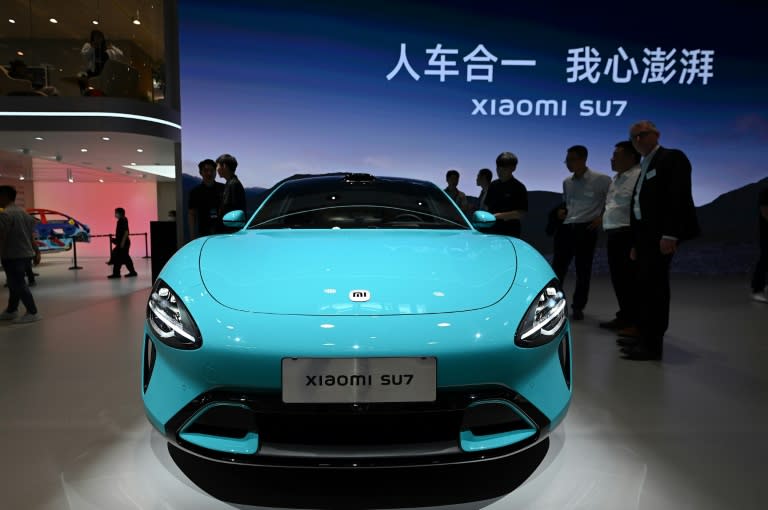Five things we learned at the China Auto Show

One of China's largest auto shows kicked off in Beijing on Thursday, with electric vehicle makers keen to show off their latest designs and high-tech accessories to consumers in the fiercely competitive market.
Here are the key developments from Auto China's first day of action:
- Xiaomi -
The consumer tech giant is the latest entrant to China's cut-throat EV market, with its new SU7 model the star of the show.
Less than one month after its launch, almost 76,000 pre-orders have been placed, Xiaomi said, an accumulation of orders that will take months to deliver given its current production capacity.
Xiaomi boss Lei Jun was swarmed at Auto China on Thursday by legions of loyal fans, eager to follow the entrepreneur's every move around the convention complex.
- XPeng -
Among car giant Tesla's main rivals in the Chinese market is XPeng, which announced plans to begin large-scale deployment of AI-assisted driving in its vehicles in May.
"The AI learns the driver's habits and can then imitate their driving" and enhance security, company boss He Xiaopeng told an audience while presenting the X9, a seven-seater "so spacious it can accommodate five bicycles in its trunk".
- CATL -
Also present at the show was Chinese battery giant CATL, founded in 2011 in the eastern city of Ningde and now the undisputed global leader in EV batteries.
Its factories produce more than a third of car batteries sold worldwide and are equipped in models from a long line of foreign manufacturers including Mercedes, BMW, VW, Tesla, Toyota, Honda and Hyundai.
Responding Thursday to one of the main criticisms of EVs -- long charging times that restrict mobility -- CATL announced a remedy: "Shenxing Plus", an ultra-fast battery pack that the firm says earns one kilometre (0.62 miles) in range for every second of charging.
- Nio -
In contrast to much of the EV industry, Chinese automaker Nio focuses on battery-swap technology rather than recharging individual vehicles.
The Shanghai-based firm founded 10 years ago said Thursday it had accumulated nearly 2,500 battery swapping points across China.
Nio also presented its ET7, a sedan model the firm claims has a range of 1,000 kilometres.
- Tencent-Toyota alliance -
Japanese auto-making juggernaut Toyota also announced Thursday that it would join hands with Chinese tech and gaming giant Tencent in AI, a bid to capitalise on local consumers' increasing appetite for advanced smart car features.
The cooperation will apply to Toyota vehicles sold in China, said Toyota, which like other foreign manufacturers, has struggled to keep up in the ultra-competitive market as the industry shifts to electric.
sbr-ll-pfc/oho/sn


